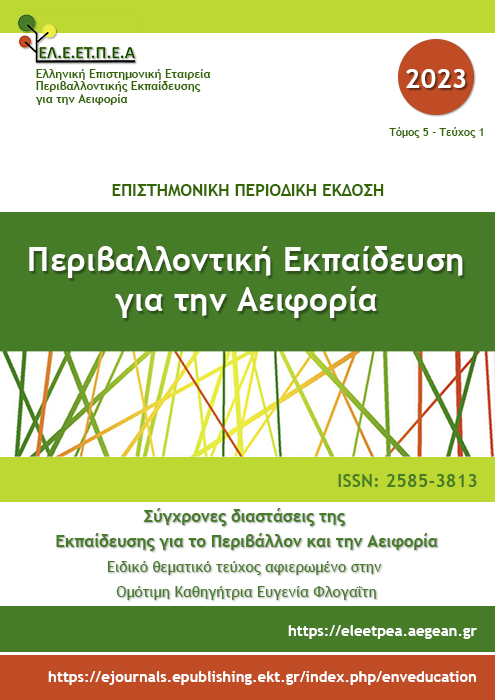Η συνεργασία σχολείου-οικογένειας μέσω της γονικής συμμετοχής στο πλαίσιο του αειφόρου σχολείου
Abstract
Environmental and Sustainability Education (ESE) involves a transformative pedagogical process, which seeks to create a new educational framework. The sustainable school adopts the principles of ESE and transforms to a learning organization, in three connected levels of operation, encouraging collaborative processes and promoting school-community cooperation. School-family collaboration through parental involvement can play an important role in these goals. We examine the research activity regarding the factors that influence parental involvement and its benefits in children’s education, in conjunction with the Epstein et al.’s typology of involvement (2019). Types such as, parenting, communicating, volunteering, learning at home, reinforce the possibility of all parents to participate in their children’s education and overcome the obstacles that limit the collaboration between school and family. The design and the implementation of different types of parental involvement will promote positive outcomes for students, teachers, and parents. Similar results occurred in the doctoral thesis carried out under the supervision of Emeritus Professor E. Flogaiti, entitled, “School-family collaboration in the context of the sustainable school. Action research in a nursery school”.
Article Details
- How to Cite
-
Ναούμ Έ. (2023). Η συνεργασία σχολείου-οικογένειας μέσω της γονικής συμμετοχής στο πλαίσιο του αειφόρου σχολείου . Environmental Education for Sustainability, 5(1), 200–217. https://doi.org/10.12681/ees.35782
- Section
- Articles

This work is licensed under a Creative Commons Attribution-NonCommercial-ShareAlike 4.0 International License.
Authors retain copyright and grant the journal right of first publication with the work simultaneously licensed under a CC-BY-NC-SA that allows others to share the work with an acknowledgement of the work's authorship and initial publication in this journal.


